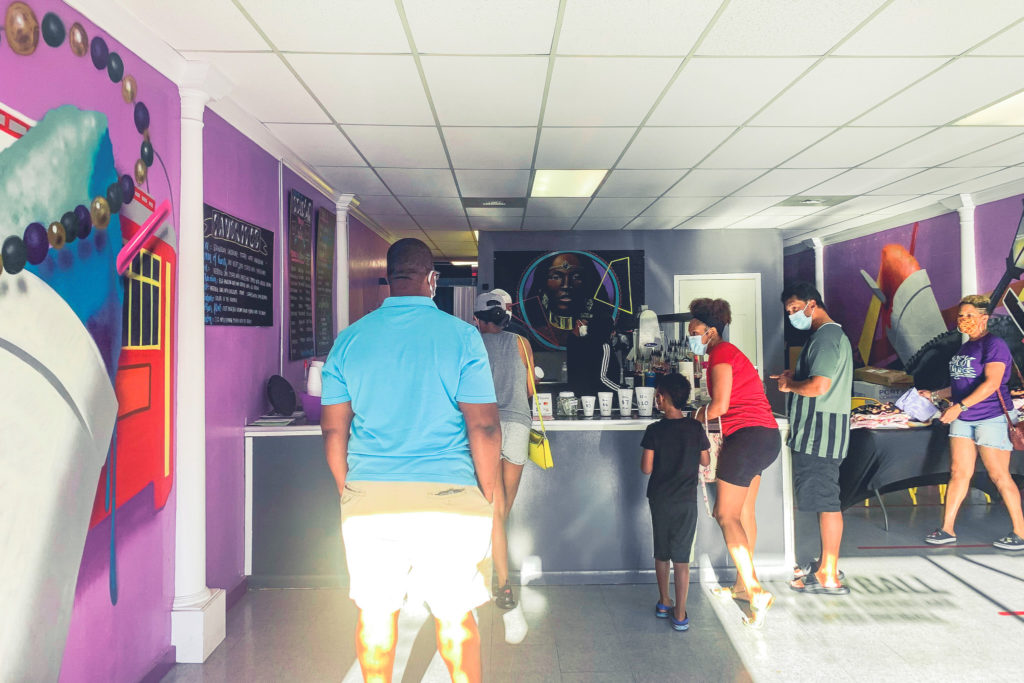Activism | August 24th, 2021
Can We Sustain The Support For Black-Owned Businesses?
By: Khedgen Willis

When you think of a Black-owned business what comes to mind may be the quaint coffee shop downtown, the mom-and-pop soul food restaurant that you grew up eating or even someone you know who sells apparel that you never knew you needed. Nonetheless, the phrase “buying Black” has increased in colloquial relevancy as more entrepreneurs seek to contribute to the community’s economy. The real question is: Will “buying Black” continue to be a priority to the Black community?
The protests that ignited during the summer of 2020 galvanized Black Americans to rethink their purchasing power. While brands and corporations refused to publicly decry the unjust murder of George Floyd, many vowed to support Black-owned businesses in an effort to invigorate the community’s once-thriving hubs of economic growth.
Black-owned businesses have thrived in Black communities for decades, but have ultimately been faced with racially charged restrictions or even grave acts of supremacy. In particular, the Greenwood District of Tulsa, Okla. — known as “Black Wall Street”— was recognized as the mecca of buying Black in the 20th century as it flaunted over 600 businesses. Unfortunately during the summer of 1921, mobs of white residents that were weaponized by their city officials set the community aflame. The Tulsa Race Massacre not only destroyed the livelihood of the Black residents but the increasing awareness of the monumental turning point on the national scale has inspired a new wave of support to Black businesses.
“I believe the Black community is currently trying to support Black businesses the best we can”
Ashley Jones, the founder of Tones of Melanin, believed that the lack of diversity within the collegiate clothing for historically Black colleges and universities sparked her apparel company. Students and alumni of HBCUs have often felt excluded from mainstream college paraphernalia.
Even though Jones started her business in 2017 to “increase the marketing reach of HBCUs,” she says she has witnessed that her brand’s popularity amongst the HBCU community drastically increased over the last year.
“I believe the Black community is currently trying to support Black businesses the best we can,” Jones said. However, she also believes that the stereotype that Black businesses are innately unprofessional also looms over them. She continued, “I believe the Black community can support Black-owned businesses better by giving praise when businesses do a good job.” She added, ”Black businesses receive more negative than positive reviews.”
“With time, I believe more and more Black businesses will get the support they deserve”
Andrew Chiwara, a fourth-year agribusiness student at Florida A&M University, is the founder of Cozartt’s Collection. After moving to college in 2019, it was the first time he didn’t have his own money readily available to him, so he decided to launch a business venture to cater to the vast population of women at FAMU. Balancing a full course load, the 20-year-old has since expanded his brand to swimwear, wigs, hair accessories and apparel. While he has seen an increase in sales since the protests last year, he also still believes the Black community deserves more support. “I don’t believe we get support, but it’s not as black and white as that. With time, I believe more and more Black businesses will get the support they deserve,” Chiwara said.
Among the local businesses in Tallahassee, Fla., SneauxBalls Catering Co. has become a community favorite. Jarrett Malloy, the owner of the ice treat store, started making snowballs as a fundraiser to raise funds for a youth development program he created for student-athletes. After attending college, where snowballs are a staple product, Malloy decided to officially start his business. The business has grown in multiple ways, expanding its array of flavors and its customer base, and Malloy also agrees that since last summer he has seen an increase in support.
Malloy says this support has created a two-way relationship between the business and the community he serves. “When a business holds itself at a high standard, the expectations are raised by supporters. Without the support, businesses will not succeed,” said Malloy. “We make the community a true part of the business”
Since last summer businesses have been growing exponentially and have been receiving well-deserved publicity. However, Black entrepreneurs are hoping that this tidal wave of support is sustained in the future.






